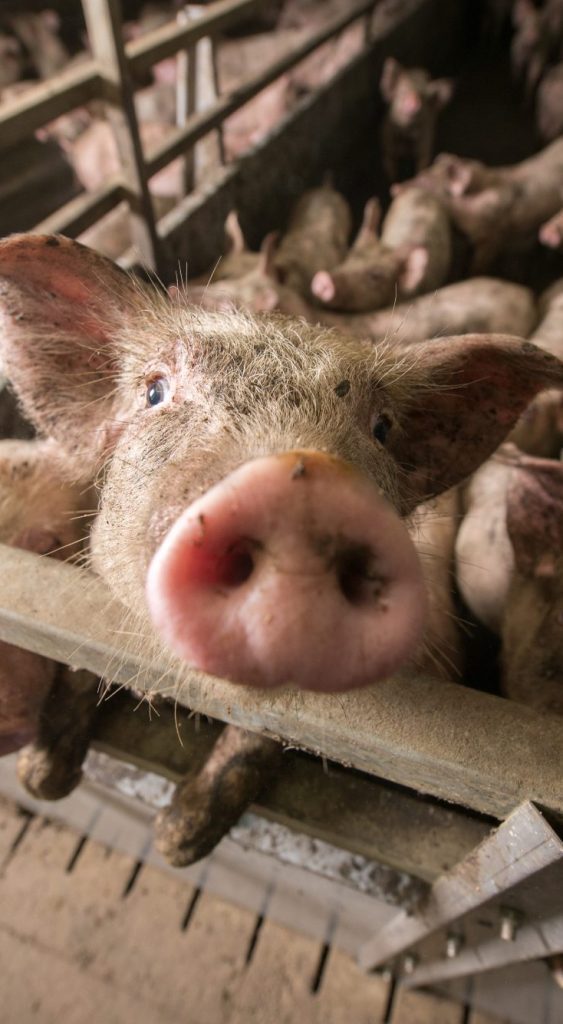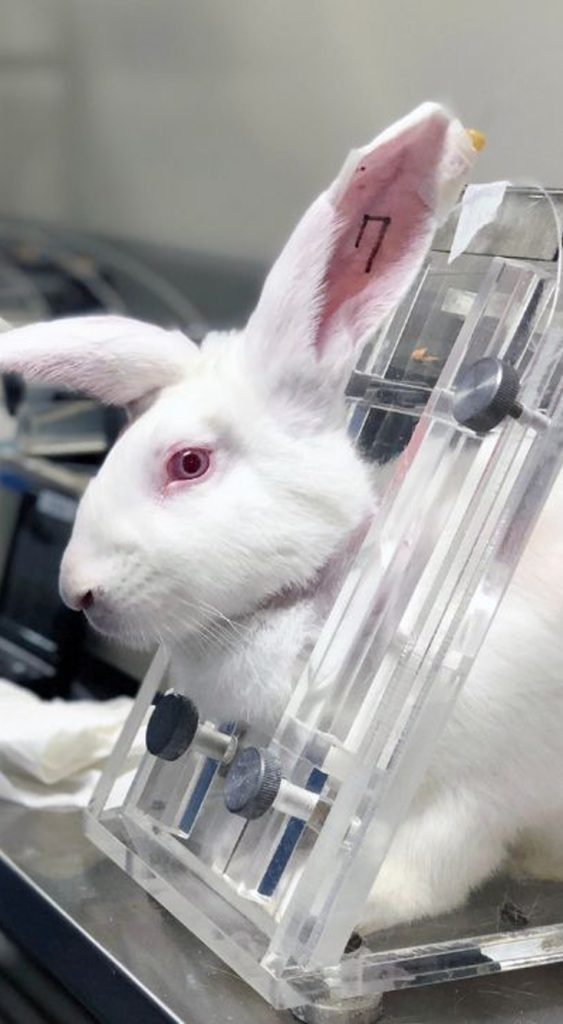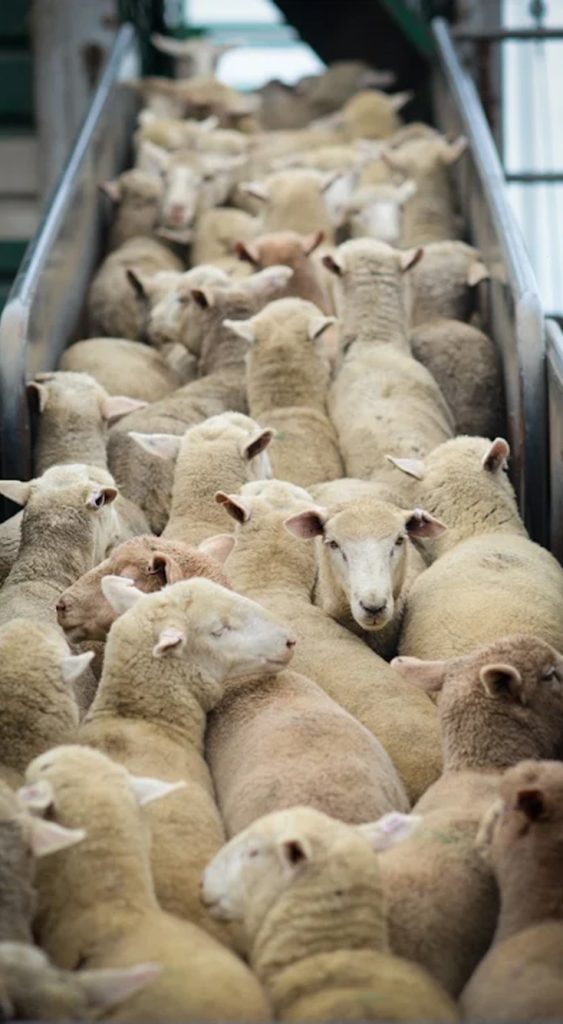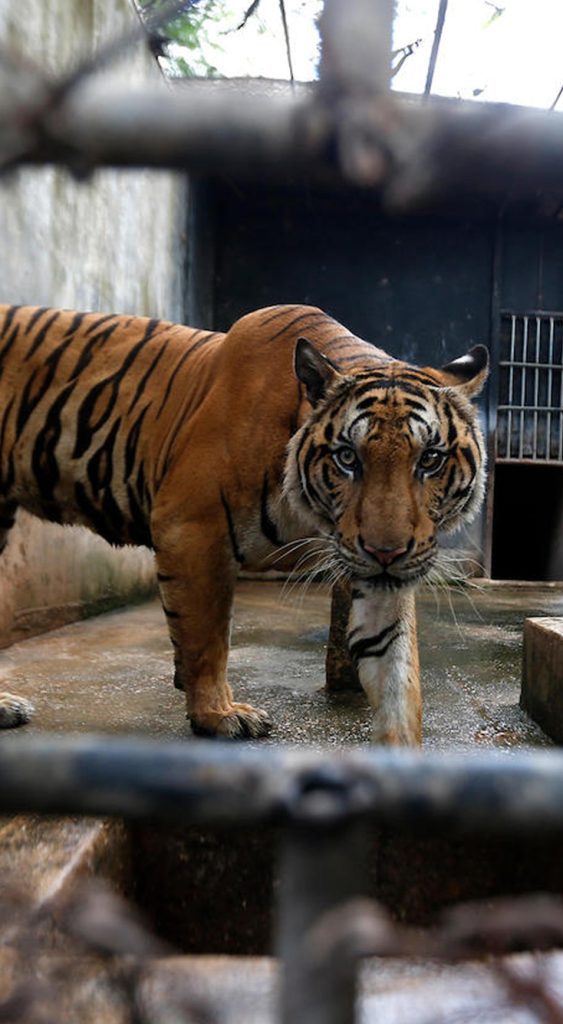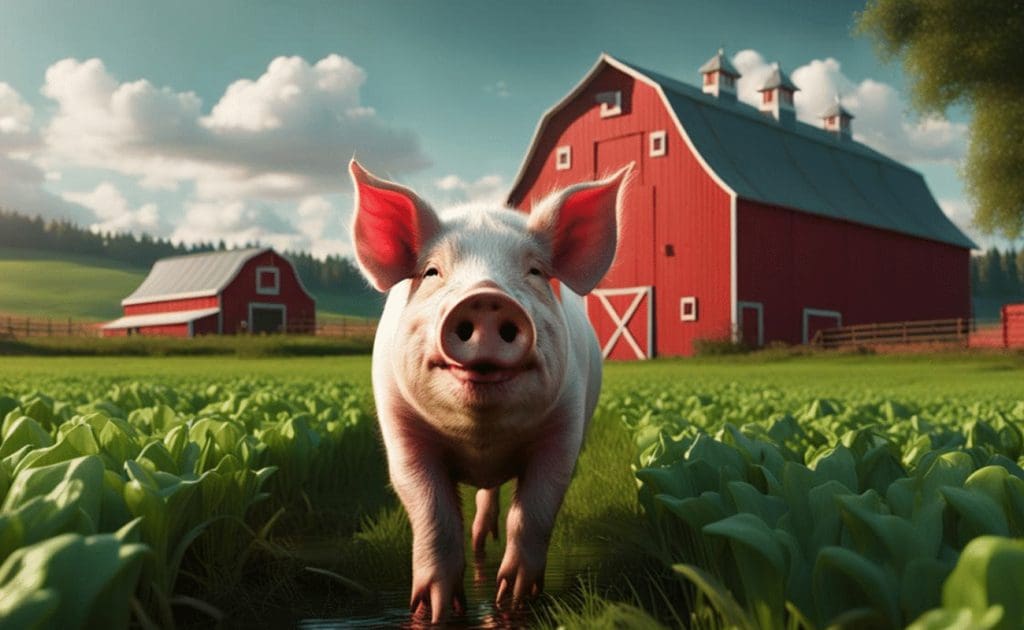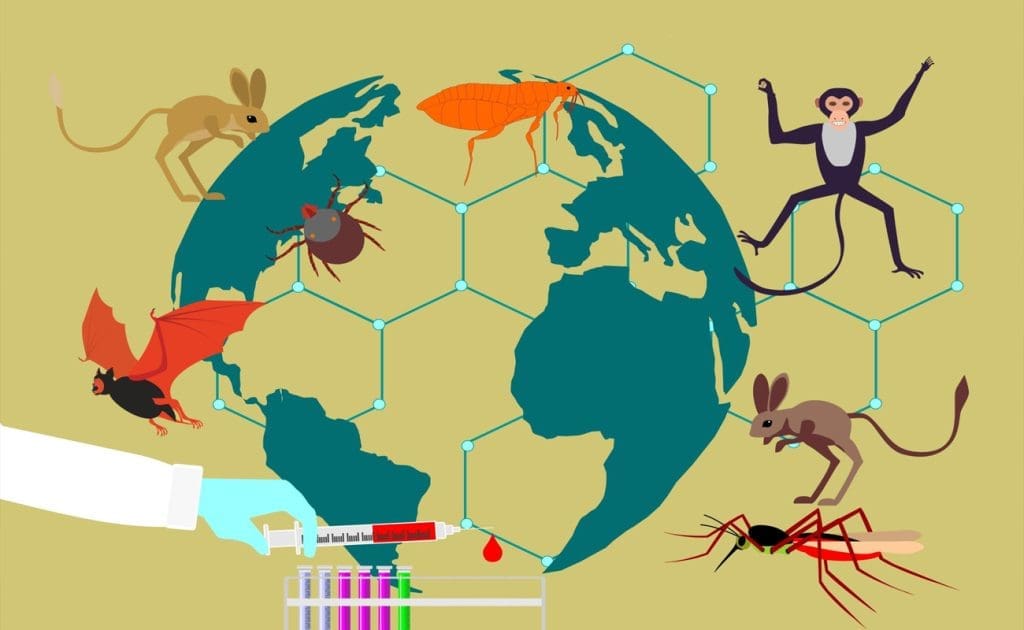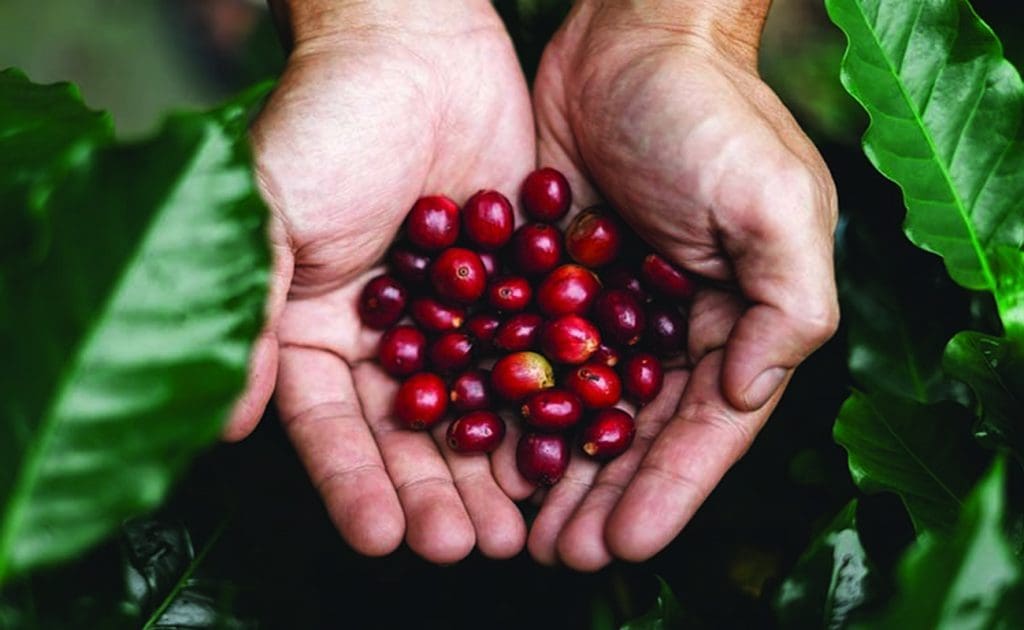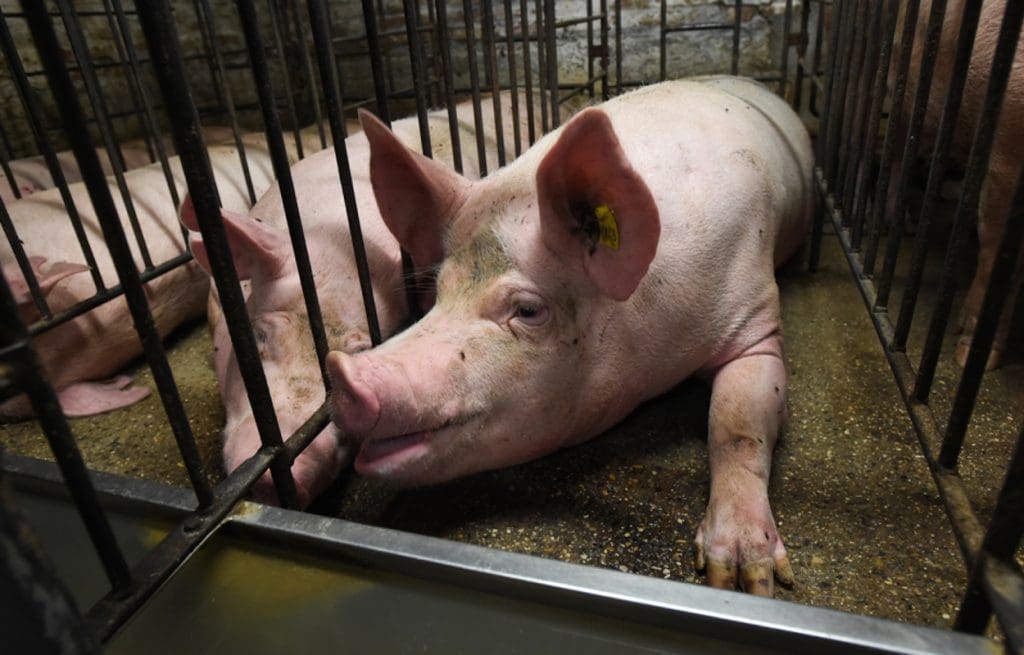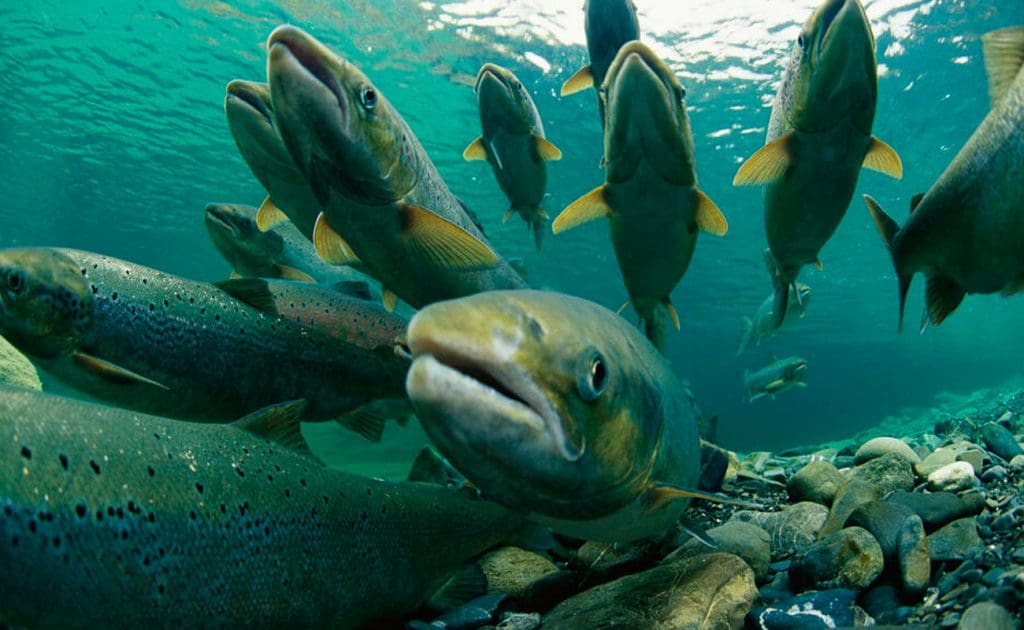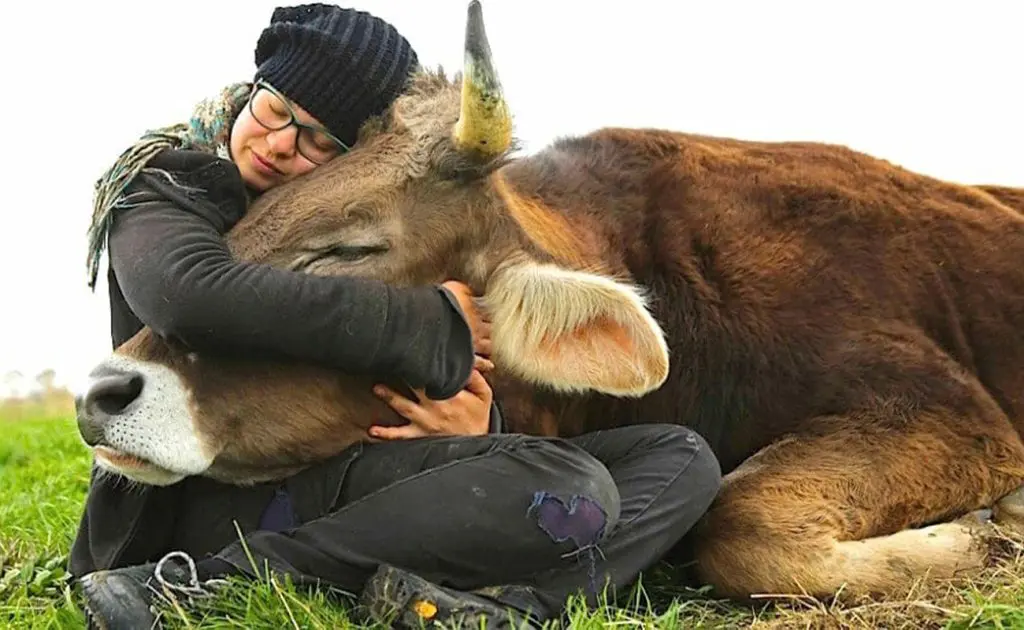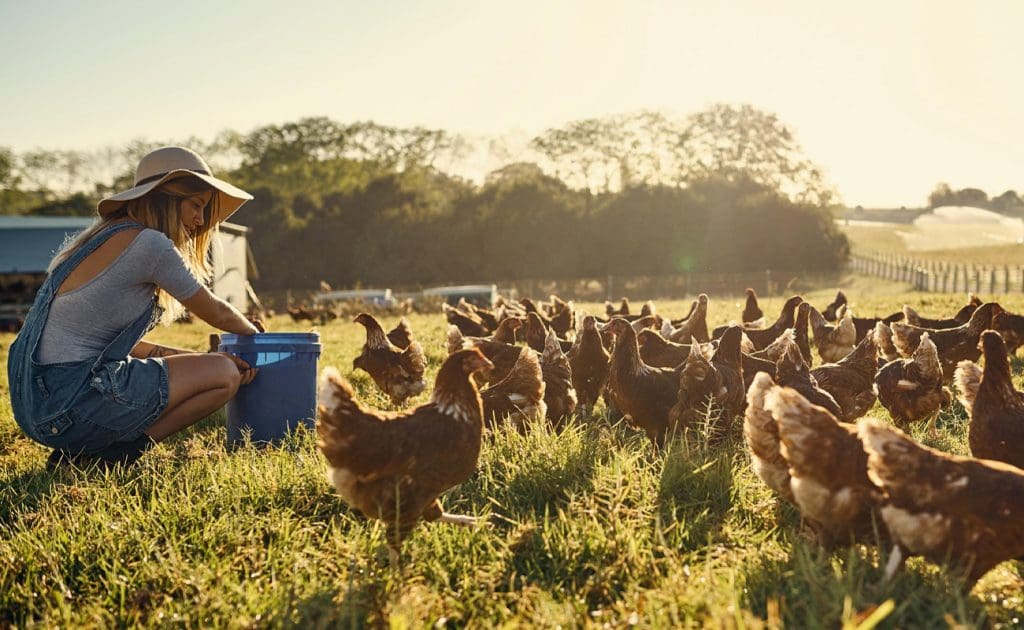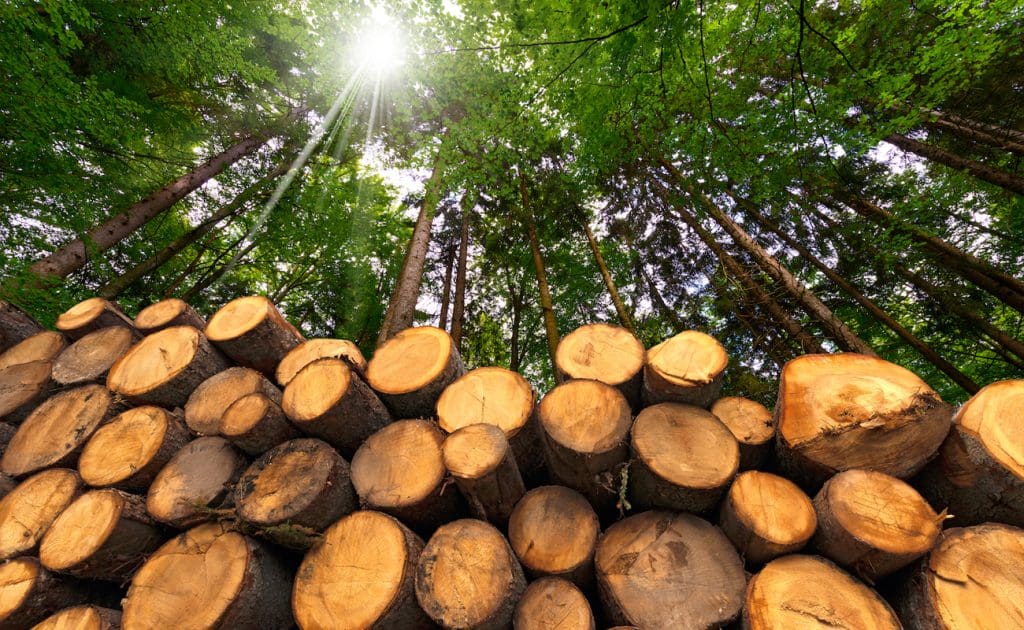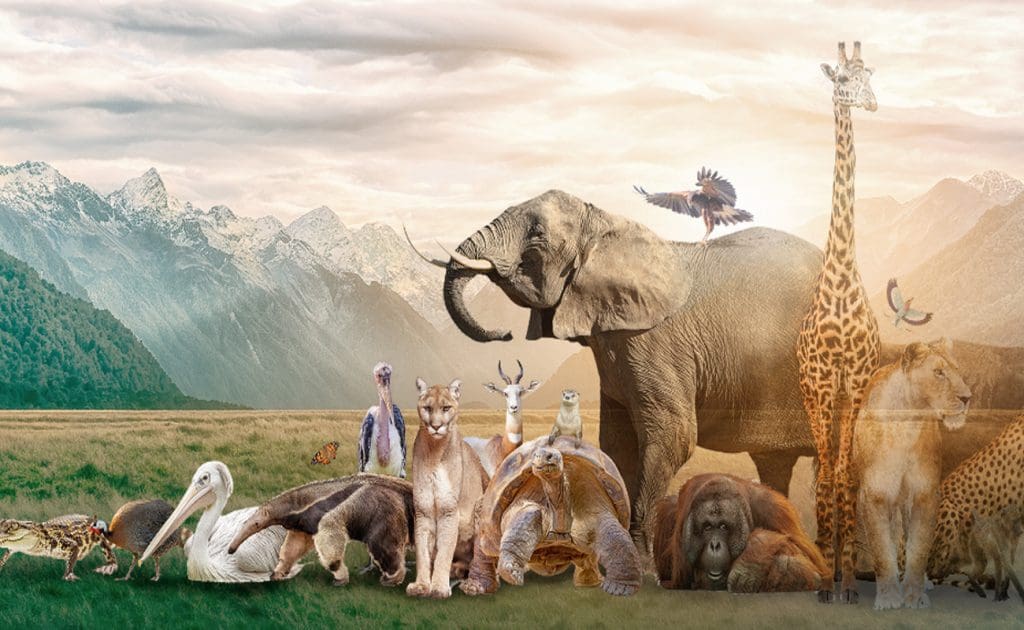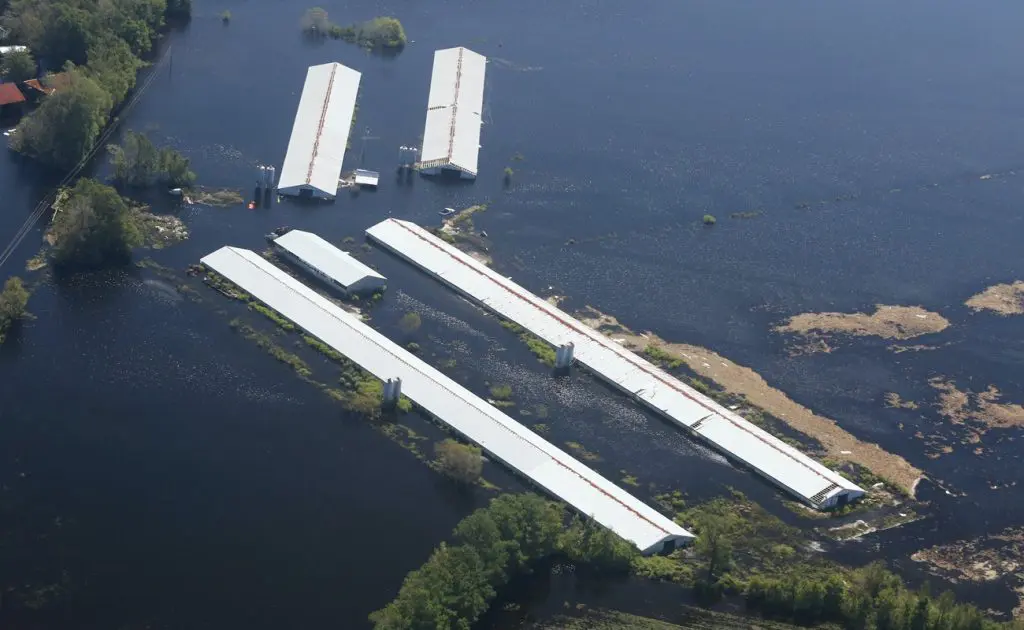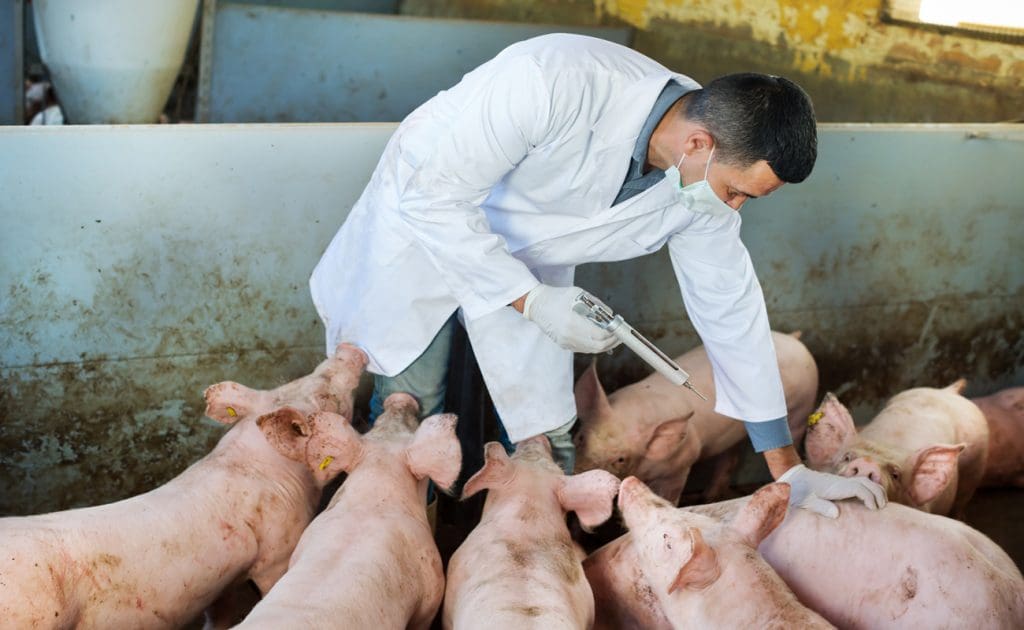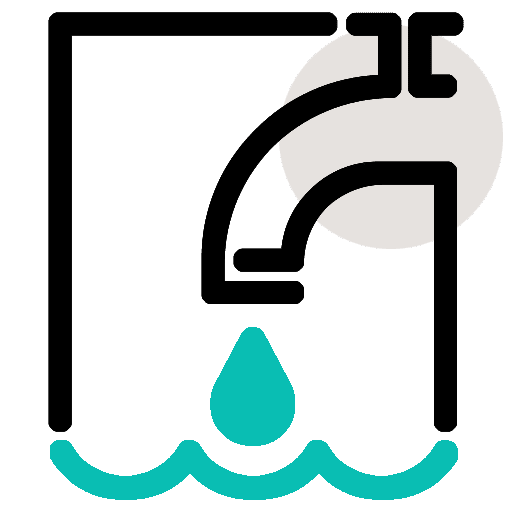
15,000 liters
of water are required to produce just one kilogram of beef — a stark example of how animal agriculture consumes one-third of the world’s freshwater. [1]

80%
of Amazon deforestation is caused by cattle ranching — the number one culprit behind the destruction of the world’s largest rainforest. [2]
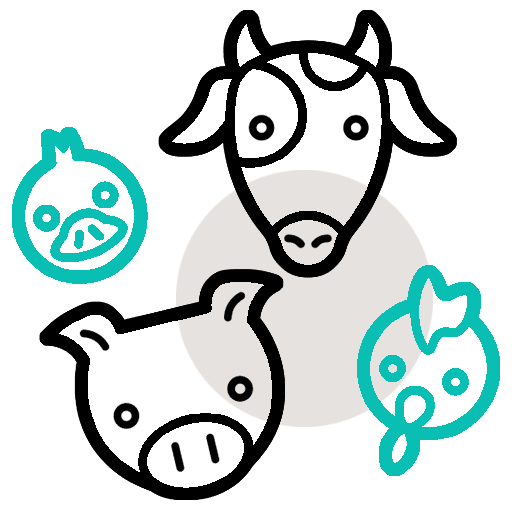
77%
of global agricultural land is used for livestock and animal feed — yet it provides just 18% of the world’s calories and 37% of its protein. [3]

GHGs
Industrial animal agriculture produces more greenhouse gases than the entire global transportation sector combined. [4]

92 billion
of the world’s land animals are killed for food every year — and 99% of them endure life on factory farms. [5]

400+ types
of toxic gases and 300+ million tons of manure are generated by factory farms, poisoning our air and water. [6]

1,048M Tonnes
of grain are fed to livestock annually — enough to end global hunger multiple times over. [7]

37%
of methane emissions come from animal agriculture — a greenhouse gas 80 times more potent than CO₂, driving climate breakdown. [8]
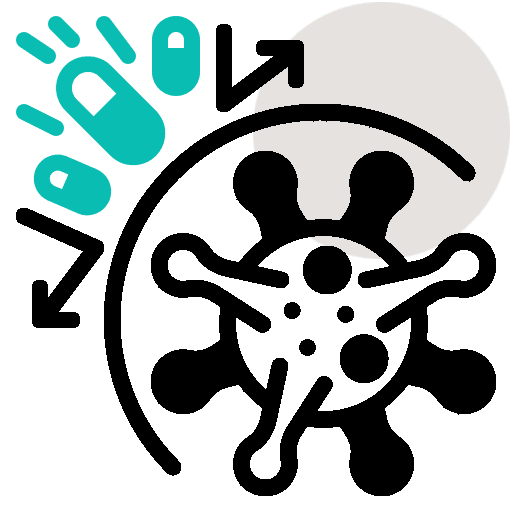
80%
of antibiotics globally are used in factory farmed animals, fueling antibiotic resistance. [9]

1 to 2.8 trillion
sea animals are killed annually by fishing and aquaculture — most are not even counted in animal agriculture statistics. [10]

60%
of global biodiversity loss is linked to food production — with animal agriculture being the leading driver. [11]

75%
of global agricultural land could be freed if the world adopted plant-based diets — unlocking an area the size of the United States, China, and the European Union combined. [12]

What we do
The best thing we can do is to change the way we eat. A plant-based diet is a more compassionate choice for both our planet and the diverse species we coexist with.

Save the Earth
Animal agriculture is the leading cause of biodiversity loss and species extinction globally, posing a severe threat to our ecosystems.
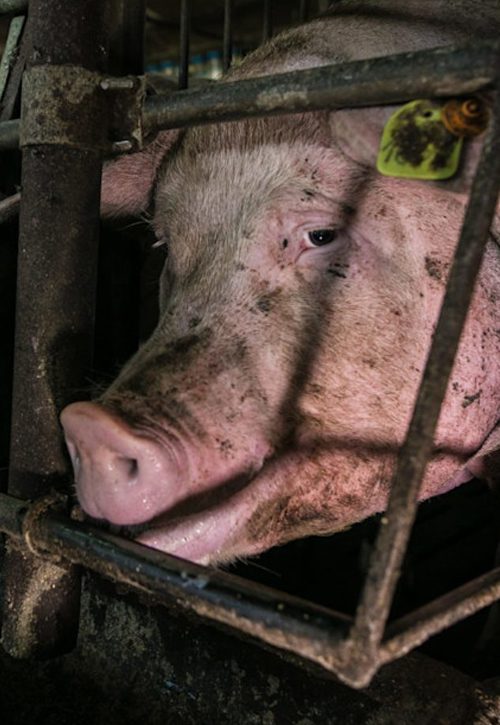
End Their Suffering
Factory farming relies heavily on consumer demand for meat and animal-derived products. Every plant-based meal contributes to liberating animals from systems of cruelty and exploitation.

Thrive on Plants
Plant-based foods are not only flavourful but also rich in essential vitamins and minerals that enhance energy and promote overall well-being. Embracing a plant-rich diet is an effective strategy for preventing chronic illnesses and supporting long-term health.
Factory farming cruelty:
Where animals suffer in silence, We become their voice.
Animal Suffering in Agriculture
Wherever animals are harmed or their voices go unheard, we step in to confront cruelty and champion compassion. We work tirelessly to expose injustice, drive lasting change, and protect animals wherever their welfare is threatened.
The Crisis
The Truth Behind Our Food Industries
The truth behind our food industries reveals a hidden reality of factory farming cruelty, where billions of animals endure immense suffering each year. Beyond the impact on animal welfare, industrial farming also causes serious environmental damage, from climate change to biodiversity loss. At the same time, the system contributes to rising health risks, including obesity, diabetes, and heart disease. Choosing a plant-based diet and embracing sustainable living habits offers a powerful solution — reducing animal suffering, protecting the planet, and improving human health.
THE MEAT INDUSTRY
ANIMALS KILLED FOR MEAT
Animals killed for their meat begin suffering the day they are born. The meat industry is linked to some of the most severe and inhumane treatment practices.

Cows
Born into suffering, cows endure fear, isolation, and brutal procedures like horn removal and castration—long before the slaughter begins.
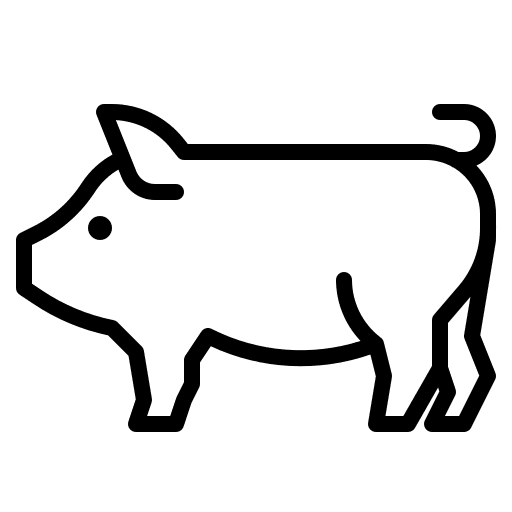
Pigs
Pigs, more intelligent than dogs, spend their lives in cramped, windowless farms. Female pigs suffer most—repeatedly impregnated and confined to crates so small they can’t even turn to comfort their young.
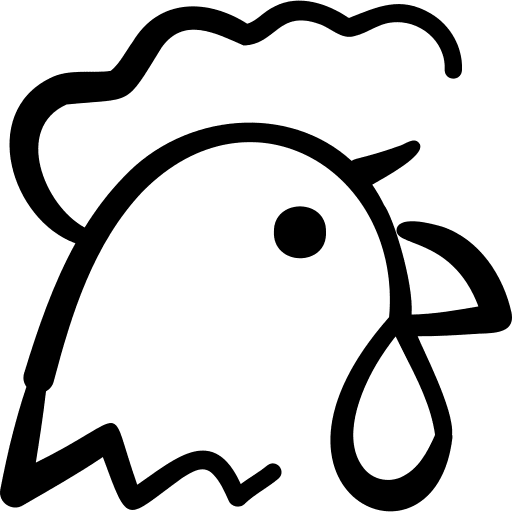
Chickens
Chickens endure the worst of factory farming. Packed into filthy sheds by the thousands, they’re bred to grow so fast their bodies can’t cope—leading to painful deformities and early death. Most are killed at just six weeks old.
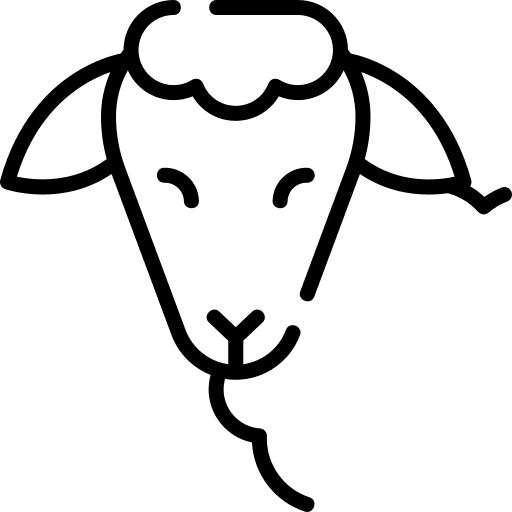
Lambs
Lambs endure painful mutilations and are torn from their mothers just days after birth—all for the sake of meat. Their suffering begins far too early and ends far too soon.

Rabbits
Rabbits suffer brutal killings with no legal protection—many are beaten, mishandled, and have their throats slit while still conscious. Their silent agony often goes unseen.

Turkeys
Every year, millions of turkeys face cruel deaths, many dying from stress during transport or even being boiled alive in slaughterhouses. Despite their intelligence and strong family bonds, they suffer quietly and in great numbers.
BEYOND THE CRUELTY
The meat industry harms both the planet and our health.
Meat's Environmental Impact
Raising animals for food consumes huge amounts of land, water, energy and causes major environmental harm. The UN’s FAO says reducing animal product consumption is vital to fight climate change, as livestock farming accounts for nearly 15% of global greenhouse gas emissions. Factory farms also waste vast water resources—for feed, cleaning, and drinking—while polluting over 35,000 miles of waterways in the U.S.
Health Risks
Eating animal products increases the risk of serious health issues. The WHO classifies processed meat as a carcinogen, raising the risk of colon and rectal cancer by 18%. Animal products are high in saturated fats linked to heart disease, strokes, diabetes, and cancer—leading causes of death in the U.S. Studies show vegetarians live longer; one study found they were 12% less likely to die over six years compared to meat-eaters.
THE DAIRY INDUSTRY
DAIRY’S DARK SECRET
Behind every glass of milk is a cycle of suffering—mother cows are repeatedly impregnated, only to have their calves taken away so their milk can be harvested for humans.
Broken Families
On dairy farms, mothers cry for their calves as they're taken away—so the milk meant for them can be bottled for us.
Confined Alone
Calves, ripped from their mothers, spend their early lives in cold isolation. Their mothers remain tethered in cramped stalls, enduring years of silent suffering—just to produce milk never meant for us.
Painful Mutilations
From the searing pain of branding to the raw agony of dehorning and tail docking—these violent procedures are done without anaesthesia, leaving cows scarred, terrified, and broken.
Brutally killed
Cows bred for dairy face a cruel end, slaughtered far too young once they no longer produce milk. Many endure painful journeys and remain conscious during slaughter, their suffering hidden behind industry walls.
BEYOND THE CRUELTY
Cruel dairy harms the environment and our health.
The Environmental Cost of Dairy
Dairy farming releases large amounts of methane, nitrous oxide, and carbon dioxide—potent greenhouse gases that harm the atmosphere. It also drives deforestation by converting natural habitats into farmland and pollutes local water sources through improper manure and fertiliser handling.
Health Risks
Consuming dairy products is linked to higher risks of serious health issues, including breast and prostate cancers, due to milk’s high insulin-like growth factor levels. While calcium is essential for strong bones, dairy is not the only or best source; leafy greens and fortified plant-based drinks offer cruelty-free, healthier alternatives.
THE EGG INDUSTRY
THE LIFE OF A CAGED HEN
Hens are social animals that enjoy foraging and caring for their families, but they spend up to two years cramped in tiny cages, unable to spread their wings or behave naturally.
34 hours of suffering: The real cost of an egg
Male Chick Cull
Male chicks, unable to lay eggs or grow like meat chickens, are considered worthless by the egg industry. Immediately after hatching, they are separated from females and cruelly killed—either suffocated or ground up alive in industrial machines.
Intense Confinement
In the U.S., nearly 75% of hens are crammed into tiny wire cages, each with less space than a sheet of printer paper. Forced to stand on hard wires that injure their feet, many hens suffer and die in these cages, sometimes left to decay among the living.
Cruel Mutilations
Hens in the egg industry suffer severe stress from extreme confinement, leading to harmful behaviours like self-mutilation and cannibalism. As a result, workers cut off some of their sensitive beaks without painkillers.
BEYOND THE CRUELTY
The egg industry harms both our health and the environment.
Eggs and the environment
Egg production significantly harms the environment. Each egg consumed generates half a pound of greenhouse gases, including ammonia and carbon dioxide. Additionally, large amounts of pesticides used in egg farming pollute local waterways and the air, contributing to widespread environmental damage.
Health Risks
Eggs can carry harmful Salmonella bacteria, even when they look normal, causing illness symptoms like diarrhoea, fever, abdominal pain, headache, nausea, and vomiting. Factory-farmed eggs often come from hens kept in poor conditions and may contain antibiotics and hormones that pose health risks. Additionally, the high cholesterol content in eggs can contribute to heart and vascular problems in some individuals.
THE FISHING INDUSTRY
THE DEADLY FISH INDUSTRY
Fish feel pain and deserve protection, but have no legal rights in farming or fishing. Despite their social nature and ability to feel pain, they are treated as mere commodities.
Factory fish farms
Most fish consumed today are raised in crowded inland or ocean-based aquafarms, confined their entire lives in polluted waters with high levels of ammonia and nitrates. These harsh conditions lead to frequent parasite infestations that attack their gills, organs, and blood, as well as widespread bacterial infections.
Industrial Fishing
Commercial fishing causes immense animal suffering, killing nearly a trillion fish annually worldwide. Massive ships use long lines—up to 50 miles with hundreds of thousands of baited hooks—and gill nets, which can stretch from 300 feet to seven miles. Fish swim blindly into these nets, often suffocating or bleeding to death.
Cruel Slaughter
Without legal protections, fish suffer horrific deaths in U.S. slaughterhouses. Stripped from water, they gasp helplessly as their gills collapse, slowly suffocating in agony. Larger fish—tuna, swordfish—are brutally clubbed, often wounded but still conscious, forced to endure repeated strikes before death. This relentless cruelty remains hidden beneath the surface.
BEYOND THE CRUELTY
The fishing industry devastates our planet and harms our health.
Fishing and the Environment
Industrial fishing and fish farming both harm the environment. Factory fish farms pollute water with toxic levels of ammonia, nitrates, and parasites, causing widespread damage. Large commercial fishing vessels scrape the ocean floor, destroying habitats and discarding up to 40% of their catch as bycatch, worsening the ecological impact.
Health Risks
Eating fish and seafood carries health risks. Many species like tuna, swordfish, shark, and mackerel contain high mercury levels, which can harm the developing nervous systems of fetuses and young children. Fish can also be contaminated with toxic chemicals like dioxins and PCBs, linked to cancer and reproductive problems. Additionally, studies show that fish consumers may ingest thousands of tiny plastic particles annually, which could cause inflammation and muscle damage over time.
200 Animals.
That’s how many lives one person can spare each year by going vegan.
At the same time, if the grain used to feed livestock were instead used to feed people, it could provide food for up to 3.5 billion people annually.
A critical step in addressing global hunger.



Cruel Confinement
The Reality of Factory Farming
Around 99% of farmed animals spend their entire lives inside massive industrial factory farms. In these facilities, thousands are packed into wire cages, metal crates, or other restrictive enclosures within filthy, windowless sheds. They are denied the most basic natural behaviours—raising their young, foraging in the soil, building nests, or even feeling sunlight and fresh air—until the day they are transported to slaughterhouses.
The factory farming industry is built on maximising profit at the animals’ expense. Despite the cruelty, the system continues because it is seen as more profitable, leaving behind a devastating trail of animal suffering hidden from public view.
Animals on factory farms endure constant fear and torment:
Space Restrictions
Animals are often so cramped they cannot turn or lie down. Hens live in tiny cages, chickens and pigs in overcrowded sheds, and cows in filthy feedlots.
Antibiotic Use
Antibiotics speed growth and keep animals alive in unsanitary conditions, which can promote antibiotic-resistant bacteria harmful to humans.
Genetic Manipulation
Many animals are altered to grow larger or produce more milk or eggs. Some chickens become too heavy for their legs, leaving them starving or unable to reach food and water.
Ready to Make a Difference?
You’re here because you care — about people, animals, and the planet.

Why Choose a Plant-Based Life?
Explore the powerful reasons behind going plant-based—from better health to a kinder planet. Find out how your food choices truly matter.

Your Guide to Starting a Plant-Based Lifestyle
Discover simple steps, smart tips, and helpful resources to begin your plant-based journey with confidence and ease.
Sustainable Living for a Greener Future.
Choose plants, protect the planet, and embrace a kinder future — a way of living that nurtures your health, respects all life, and ensures sustainability for generations to come.
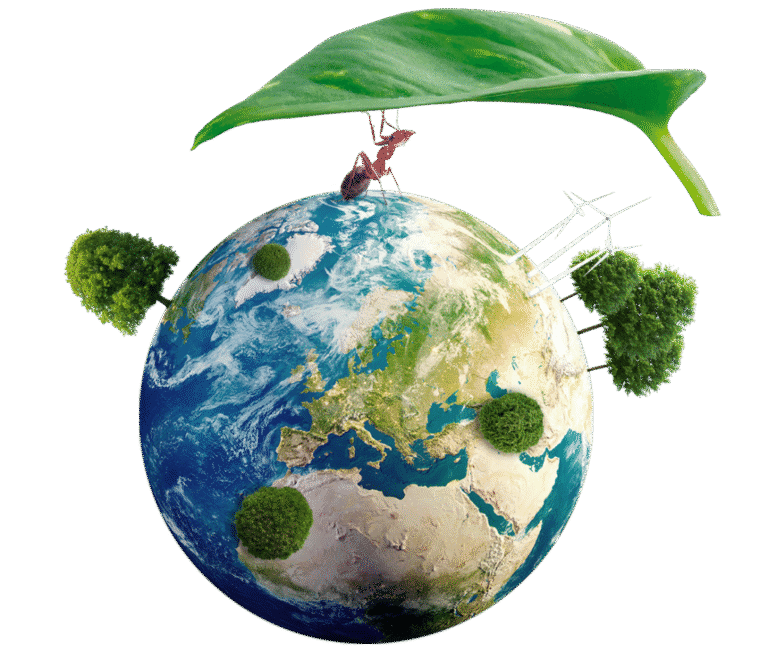
For Humans
Human Health Risks From Factory Farming
Factory farming is a massive health hazard to human beings and it results from careless and filthy activities. One of the most serious issues is antibiotic overuse in livestock, which is widespread in these factories to fend off diseases in overcrowding and stressful conditions. This intense use of it leads to the formation of bacteria that are resistant to antibiotics, which are then transferred to humans from direct contact with the infected, the consumption of infected products, or environmental sources like water and soil. The spread of these “superbugs” is a major threat to the world’s health as it can make infections that were easily treated in the past resistant to medications or event incurable. In addition, factory farms also create a perfect climate for the emergence and spread of zoonotic pathogens—illness that can be acquired and transmitted from animals to humans. Germs such as Salmonella, E. coli, and Campylobacter are the inhabitants of the dirty factory farms whose spread increases the chances of their existence in meat, eggs, and dairy products leading to foodborne illnesses and outbreaks. Beside the microbial risks, factory-farmed animal products are often rich in saturated fats and cholesterol, causing several chronic illnesses, such as obesity, cardiovascular disease, and type-2 diabetes. Besides, the excessive use of growth hormones in livestock has raised concerns about possible hormonal imbalances as well as long-term health effects of humans who consume these products. The environmental pollution caused by factory farming also indirectly affects the health of nearby communities as animal waste can penetrate drinking water with dangerous nitrates and bacteria resulting in gastrointestinal issues and other health problems. Prior to that, these dangers underscore the necessity of immediate alterations in the way food is produced in order to defend public health and also the encouragement of safer and sustainable agricultural methods.
Animal exploitation is a pervasive issue that has plagued our society for centuries. From using animals for food, clothing, entertainment,...
In recent years, the world has witnessed a rise in zoonotic diseases, with outbreaks such as Ebola, SARS, and most...
In today’s society, there has been a significant increase in the number of individuals turning to a plant-based diet. Whether...
With the increasing awareness of the negative impact of our daily consumption habits on the environment and animal welfare, ethical...
In the world of weight management, there is a constant influx of new diets, supplements, and exercise regimes promising quick...
As a society, we have long been advised to consume a balanced and varied diet to maintain our overall health...
For Animals
Suffering of Animals In Factory Farms
Factory farming is based on unimaginable cruelty to animals, viewing these animals as mere commodities rather than sentient beings who can feel pain, fear, and distress. Animals in these systems are kept in confined cages with very little room to move, much less to perform natural behaviors such as grazing, nesting, or socializing. The confined conditions inflict severe physical and psychological suffering, resulting in injuries and inducing prolonged states of chronic stress, with the development of abnormal behaviors such as aggression or self-harm. The cycle of involuntary reproductive management for mother animals is infinite, and offsprings are removed from mothers within hours of birth, causing heightened stress to both mother and young. Calves are often isolated and raised away from any social interaction and bonding with their mothers. Painful procedures like tail docking, debeaking, castration, and dehorning are performed without anesthesia or pain mitigation, causing unnecessary suffering. The selection for maximum productivity-whether faster growth rates in chickens or higher milk yields in dairy cows-has itself resulted in severe health conditions that are very painful: mastitis, organ failures, bone deformities, etc. Many species suffer for their entire lives in dirty, crowded environments, highly prone to disease, without adequate veterinary care. When denied sunlight, fresh air, and space, they suffer in factory-like conditions until the day of slaughter. This continuous cruelty raises ethical concerns but also highlights how far removed industrial farming operations are from any moral obligation to treat animals kindly and with dignity.
Animal exploitation is a pervasive issue that has plagued our society for centuries. From using animals for food, clothing, entertainment,...
With the increasing awareness of the negative impact of our daily consumption habits on the environment and animal welfare, ethical...
In recent years, the term “bunny hugger” has been used to mock and belittle those who advocate for animal rights...
The ocean covers over 70% of the Earth’s surface and is home to a diverse array of aquatic life. In...
Veganism is more than just a dietary choice—it represents a profound ethical and moral commitment to reducing harm and fostering...
Factory farming has become a widespread practice, transforming the way humans interact with animals and shaping our relationship with them...
For the Planet
Sustainability Risks From Factory Farming For the Planet
Factory farming generates a monumental amount of risk to the planet and the environment, becoming a major player in the degradation of ecology and climate change. Among the most impactful environmental consequences of intensive farming is greenhouse gas emissions. Livestock farming, especially from cattle, produces massive quantities of methane—an intense greenhouse gas that retains heat in the atmosphere very efficiently compared to carbon dioxide. So that is another major factor contributing to global warming and providing acceleration to climate change. Worldwide, the massive clearance of forestland for animal grazing or for the cultivation of monoculture crops such as soybeans and corn for animal feed presents another powerful side of factory farming in causing deforestation. In addition to reducing the planet’s capacity to absorb carbon dioxide, the destruction of forests also disrupts ecosystems and threatens biodiversity by destroying habitats for innumerable species. In addition, factory farming diverts critical water resources, since so much water is needed for the livestock, cultivation of feed crops, and disposal of waste. The indiscriminate dumping of animal wastes pollutes rivers, lakes, and groundwater with harmful substances like nitrates, phosphates, and viable organisms, leading to water pollution and the spawning of dead zones in the oceans where marine life cannot exist. Another problem is soil degradation due to nutrient depletion, erosion, and desertification owing to over-exploitation of land for feed production. Furthermore, the heavy use of pesticides and fertilizers destroys the surrounding ecosystem which harms pollinators, wildlife, and human communities. Factory farming not only compromises health on planet Earth, but also increases the stress on natural resources thereby standing in the way of environmental sustainability. To tackle these issues, a transition to more sustainable food systems is essential, ones that include ethical considerations for human and animal welfare and the environment itself.
As the global population continues to grow, so does the demand for food. One of the primary sources of protein...
With the increasing awareness of the negative impact of our daily consumption habits on the environment and animal welfare, ethical...
Livestock farming has been a central part of human civilization for thousands of years, providing a vital source of food...
As a society, we have long been advised to consume a balanced and varied diet to maintain our overall health...
Factory farming, also known as industrial agriculture, has become a dominant method of food production in many countries around the...
Hey there, animal lovers and eco-conscious friends! Today, we’re going to dive into a topic that might not be the...
Building a Compassionate and Sustainable Future
- In unity, let’s dream a future in which the factory farming that has made animals suffer becomes a history we can talk about with a smile on our faces, where the very same animals are weeping over their own suffering that happened long ago, and where the health of individuals and of the planet is among the main priorities of all of us. Farming is one of the major ways to produce our meals in the world; however, the system brings some bad consequences. For example, the pain animals experience is simply unbearable. They live in tight, overcrowded spaces, which means they can’t express their natural behaviors and worse still, they are subjected to innumerable instances of excruciating pain. The farming of animals is not only the reason for animals to suffer but also the environment and health appear on the radar. Overuse of antibiotics in cattle contributes to the rise of antibiotic-resistant bacteria, which pose a threat to human health. Animals like cows are also a source of pollution in the water due to the release of harmful chemicals. On the other hand, the ushering of animal agriculture through deforestation activities and climate change through the massive emission of greenhouse gases is the domineering issue.
- Our faith is in a world where every creature that is here is honored with respect and dignity, and the first light leads where the people go. Through the medium of our government, educational programs, and strategic partnerships, we have taken up the cause of telling the truth about factory farming, such as the very painful and cruel treatment of animals as animals that are enslaved have no rights and are tortured to death. Our main focus is to provide education for people so that they can make wise decisions and actually bring about real change. The Humane Foundation is a non-profit institution working towards presenting solutions to the many problems arising from factory farming, sustainability, animal welfare, and human health, thus enabling individuals to align their behaviors with their moral values. By producing and promoting plant-based substitutes, developing effective animal welfare policies, and establishing networks with similar organizations, we are devotedly striving to build an environment that is both compassionate and sustainable.
- Humane Foundation is connected by a common goal—of a world where there will be 0% of the abuse of factory farm animals. Be it a concerned consumer, an animal lover, a researcher, or a policymaker, be our guest in the movement for a change. Like a team, we can craft the world where animals are treated with kindness, where our health is priority and where the environment is kept untouched for the future generations.
- The website is the road to the knowledge of the real truths about the farm of factory origin, of the humane food through some other options and the chance to hear about our latest campaigns. We provide you with an opportunity to get involved in numerous ways including sharing plant-based meals. Also a call to action is speaking up and showing that you care about promoting good policies and educating your local neighborhood about the importance of sustainability. A small act building electrivity encourages more others to be a part of the process that will bring the world to a stage of sustainable living atmosphere and more compassion.
- It’s your dedication to compassion and your drive that to make the world better count the most. Statistics show that we are at a stage where we have the power to create the world of our dream, a world where animals are treated with empathy, human health is in its best shape and the earth is vibrant again. Get ready for the upcoming decades of compassion, fairness, and goodwill.

SOLUTION
There is only 1 solution...
Stop exploiting life on Earth.
For the Earth to regain its natural balance and recover from the environmental harm caused by factory farms, we must return the land to nature and end the exploitation of animals and ecosystems.
References
[1] https://en.wikipedia.org/wiki/Water_footprint#Water_footprint_of_products_(agricultural_sector)
[2] https://wwf.panda.org/discover/knowledge_hub/where_we_work/amazon/amazon_threats/unsustainable_cattle_ranching/
[3] https://www.weforum.org/stories/2019/12/agriculture-habitable-land/
[4] https://www.fao.org/4/a0701e/a0701e00.htm
[5] https://ourworldindata.org/data-insights/billions-of-chickens-ducks-and-pigs-are-slaughtered-for-meat-every-year
[6] https://www.worldanimalprotection.org.uk/latest/blogs/environmental-impacts-factory-farming/
[7] https://www.feedbusinessmea.com/2024/12/03/global-feed-industry-to-utilize-1048m-tonnes-of-grains-in-2024-25-igc/
[8] https://en.wikipedia.org/wiki/Livestock’s_Long_Shadow#Report
[9] https://www.who.int/news/item/07-11-2017-stop-using-antibiotics-in-healthy-animals-to-prevent-the-spread-of-antibiotic-resistance
[10] https://en.wikipedia.org/wiki/Fish_slaughter#Numbers
[11] https://www.unep.org/news-and-stories/press-release/our-global-food-system-primary-driver-biodiversity-loss
[12] https://ourworldindata.org/land-use-diets

